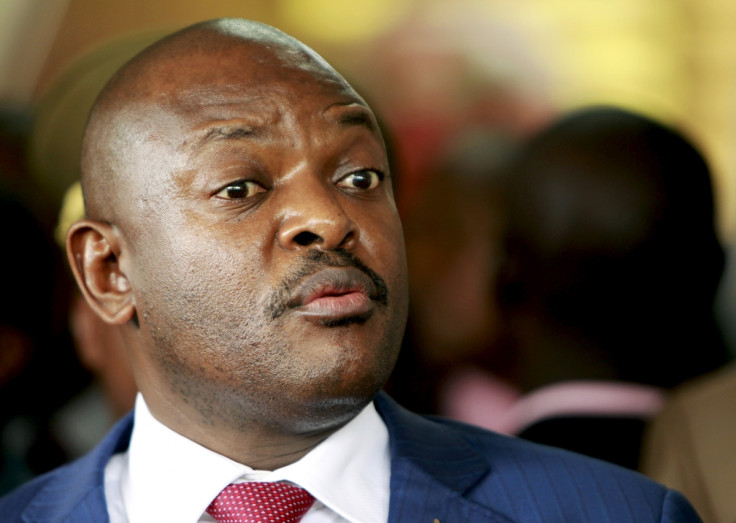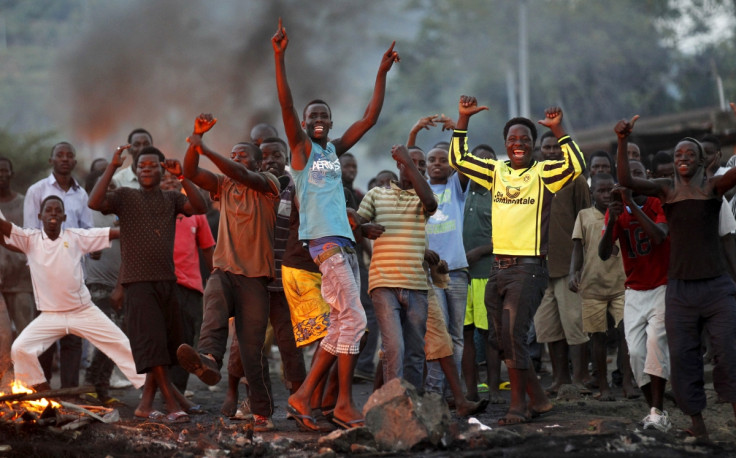Arusha peace talks in tatters as Burundi government rejects presence of opposition members
IBTimes UK speaks to activist Pacifique Nininahazwe, who was excluded from the talks.

The second round of the Burundi dialogue that was expected to resume this morning (12 July) in the Tanzanian city of Arusha has taken an unexpected turn after Burundi government officials rejected the presence of members of the opposition − effectively stopping the negotiations.
After stalling on negotiations for months, the Inter-Burundi Dialogue on the deadly political violence that has rocked Burundi for over a year hosted by facilitator and former Tanzania president Benjamin Mkapa, seems to have hit another wall.
Hopes of any progress were quashed in May during the first round of talks when the government of Bujumbura refused to hold talks with key members of the umbrella National Council for the Restoration of Arusha Agreement and Rule of Law (CNARED) and a major civil society movement known as Halte au 3e mandat − both opposed to President Pierre Nkurunziza's bid for a third-term in office. The regime describes Cnared as a "terrorist organisation".
Government 'surprised' by presence of opposition
This time round, as IBTimes UK revealed on 11 July, while the negotiators refused to invite the Cnared as an entity − as previously required by the alliance − to avoid government officials pulling out of the talks, it had instead agreed to extend the invitation to between 15 and 20 members of the Cnared. The president of civil society organisation FOCODE and a leader of Halte au 3e mandat, Pacifique Nininahazwe, was also present this morning.
However, Willy Nyamitwe, senior adviser to the president, said the ''government delegation is surprised that the (peace) facilitators invited individuals under international arrest mandate''.
La délégation du Gvt au #BurundiDialogue à Arusha est surprise de voir que la Facilitation a invité des individus sous mandat d'arrêt Intl.
— Willy Nyamitwe (@willynyamitwe) July 12, 2016
"Jean Minani (Cnared spokesman, who was not present this morning), Pacifique Nininahazwe and Armel Niyongere (for human rights organisation ACAT) are prosecuted by justice and cannot be invited to this inter-Burundian dialogue Arusha," Nyamitwe added.

Activists 'kindly asked to leave' by mediation officials
Speaking from Arusha, Nininahazwe told IBTimes UK mediation officials had "kindly asked (Niyongere and himself) to leave the meeting room" and return to their hotel room in a phone call before the meeting was underway. Cnared members had not yet arrived.
"We have been informed that the government delegation was not happy (with our presence). We could already feel it in the room when groups were forming, especially with officials from the government. Then someone from the mediation called us and kindly asked us to leave," Nininahazwe said over the phone. "We can feel that the facilitators are already in difficulty", the activist said, pointing to fears that the regime may be "testing Mkapa's resolve".
After the activists left the room, IBTimes UK understands that the former presidents who were present said the talks opening ceremony could not go ahead if a number of political actors were excluded. The ceremony was later suspended.
According to Burundi's most widely-known civil society activist, it is "impossible that Bujumbura did not know I had been invited to the talks". On 4 July, Nininahazwe said he received his official invitation − signed by Mkapa's office − and on Sunday (10 July), the Bureau of the General Secretary of the EAC sent him flight tickets to enable him to participate in the dialogue.
Nininahazwe, who was instrumental in mobilising civilians to take to the streets to protest against Nkurunziza's third term, said he was fearing for his safety while he is facing arrest in Burundi over his role, he explained the return flight he had been booked on was via Bujumbura.
The facilitator is now expected to draft a final list of participants and spend the day carrying out consultations with the different parties involved to set a clear timetable for negotiations.
© Copyright IBTimes 2025. All rights reserved.






















